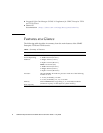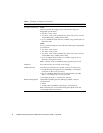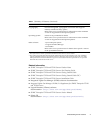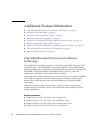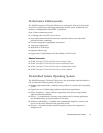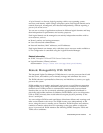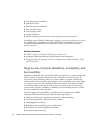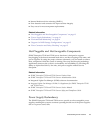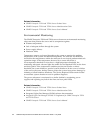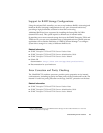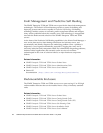
12 SPARC Enterprise T5120 and T5220 Servers Overview Guide • July 2009
■ CPU temperature conditions
■ Hard drive status
■ Enclosure thermal conditions
■ Fan speed and status
■ Power supply status
■ Voltage conditions
■ Solaris watchdog, boot time-outs, and automatic server restart events
In addition to the ILOM CLI and browser interface, you can set up the server to use
the ALOM CMT compatibility CLI. The ALOM CMT compatibility CLI provides
commands that approximate the ALOM CMT UI that was provided on some
previous servers.
Related Information
■ SPARC Enterprise T5120 and T5220 Servers Product Notes
■ Integrated Lights Out Manager (ILOM) software documentation
■ Integrated Lights Out Manager (ILOM) 3.0 Supplement for SPARC Enterprise T5120
and T5220 Servers
High Levels of System Reliability, Availability, and
Serviceability
Reliability, availability, and serviceability (RAS) are aspects of a system’s design that
affect its ability to operate continuously and to minimize the time necessary to
service the system. Reliability refers to a system’s ability to operate continuously
without failures and to maintain data integrity. System availability refers to the ability
of a system to recover to an operational state after a failure, with minimal impact.
Serviceability relates to the time it takes to restore a system to service following a
system failure. Together, reliability, availability, and serviceability features provide
for near-continuous system operation.
To deliver high levels of reliability, availability, and serviceability, the SPARC
Enterprise T5120 and T5220 servers offer the following features:
■ Ability to disable individual threads and cores without rebooting
■ Lower heat generation, reducing hardware failures
■ Hot-pluggable hard drives
■ Redundant, hot-swappable power supplies (two)
■ Redundant N+1 hot-swappable fan modules
■ Environmental monitoring



